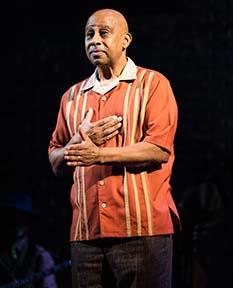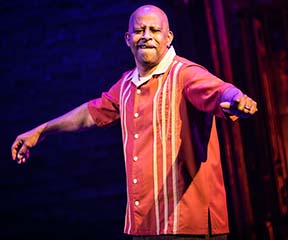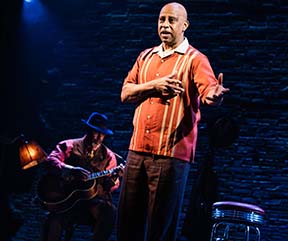By Lucy Komisar
If for nothing else, people should go to this play to see a master actor Ruben Santiago-Hudson create a neighborhood full of characters, giving life and color to each one, beginning with “Nanny,” the den-mother of the crew who ran two boarding houses, one for the violent and the crazy. He is the writer, director and performer of the piece. His change of voice, body language, facial expression for each character is magical.
This is supposed to be docudrama of his life. From the play it’s unclear of young boy Ruben’s relationship to Nanny. He is said to be the child of a bar worker. In fact, not in the play, his father was working on the railroad and was away a lot, and his mother was a drug addict. Nanny took him in as she did so many others.
We see vignettes, bits and pieces of a dysfunctional society. But it didn’t start out that way. He tells how in the early part of the century, a lot of blacks – he calls them Negroes, the term of the time — were moving from the South to cities such as Detroit, Cleveland, Buffalo, getting good jobs.
Rachel Crosby – Nanny – wouldn’t take white insult and quit her maid’s job when her boss became verbally abusive. She bought a house to take in roomers, then another one, some cars to set up a taxi service, a restaurant.
It was the mid-fifties and plants were opening around the Great Lakes. She brought people from the South to Lakawanna, outside Buffalo, provided food and shelter till they got jobs. He quips, “Like the government if it worked.”
But the people we see here did not make it.
It’s not clear what happened, but racism played a role. In his own history, we know his father was passed over for promotions his whole life, that he had to train new bosses, that though the sons of white workers got summer jobs, his father’s request was denied. (Forget about the girls!)
We meet the roomers, some 20 of them. One building houses people with prison, prostitution or church! in their background. They include the mentally ill, the thieves, the prostitutes, the violent. The roomers assigned to the other building are a bit more stable.
There’s a Negro League player who speaks in Malapropisms: “the Entire State Building” and “Beauty is in the behind of the beholder.”
A black prize fighter who comes after his abused white wife. Nanny blocks his way and takes her home; she is treated royally.
A violent couple who slash each other. Others who have killed.
All wasn’t perfect for Nanny, either. Her guy Bill had other women, other kids. Ruben jokes he was a “tootsie roll Frankenstein.”
The set is a brick wall in which a window and door with colored glass are carved. Sometimes Ruben sits on a silver red leather topped stool.
Terrific original blues by Bill Sims Jr. is performed on stage by guitarist Junior Mack. Santiago-Hudson from time to time adds a fine harmonica.
Though the vignettes fall short of a play – some are almost shaggy dog stories – the scenes are certainly colorful as well as truthful, and Santiago-Hudson is a powerful storyteller.
“Lackawanna Blues.” Written, directed and performed by Ruben Santiago-Hudson. Manhattan Theatre Club at Samuel J. Friedman Theatre, 261 West 47th Street, New York, NY. Opened Sept 28, 2021, closes Oct 31, 2021. #LackawannaOnBroadway Review on New York Theatre Wire.




